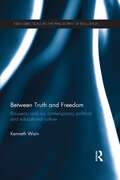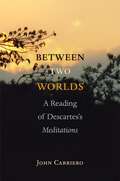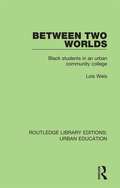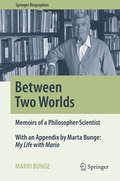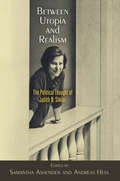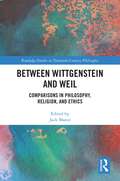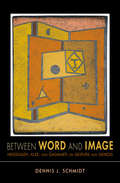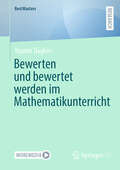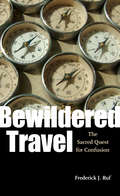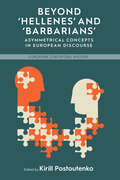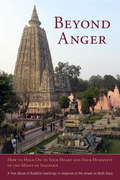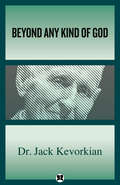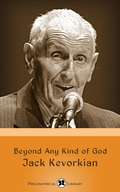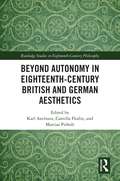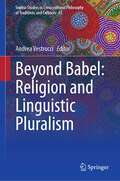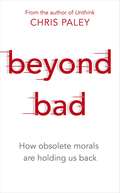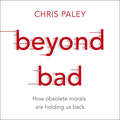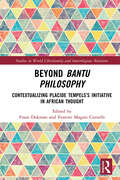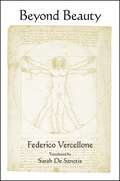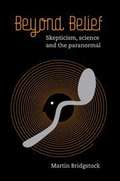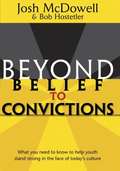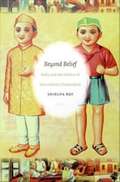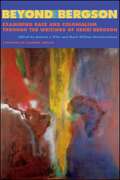- Table View
- List View
Between Truth and Freedom: Rousseau and our contemporary political and educational culture (New Directions in the Philosophy of Education)
by Kenneth WainThis book engages in a broad reading of Rousseau’s writings on educational and political thought in order to explore and address the competing demands of the enculturation and individuation of the young in Western societies. Although Rousseau’s Emile has been frequently utilised in educational debate, much of his other work has been largely neglected, as too has the relationship between his educational and political thinking, which this work seeks to redress. Drawing on the thinking of philosophers Foucault and Richard Rorty, the book considers the public and private conflicts of education and politics in modern societies, treating them as the tension between the demands of truth and freedom. This tension exists across a range of educational and political systems, such as teaching in and by the family, school, the government and, separately, for women. Wain suggests that the conflict between truth and freedom began with Rousseau and remains a central challenge in our contemporary world of political and educational thought. This book’s examination of the public and private roles in education and politics can enhance our understanding of modern educational systems and current political nihilism. Between Truth and Freedom provides an analysis of Rousseau’s position on the politics of education, arguing that his thoughts were much wider and more sophisticated than the ideas presented in Emile imply. This new consideration of the work of a classic figure will appeal to researchers and academics in the fields of the philosophy of education and political education.
Between Two Worlds: A Reading of Descartes's Meditations
by John CarrieroBetween Two Worlds is an authoritative commentary on--and powerful reinterpretation of--the founding work of modern philosophy, Descartes's Meditations. Philosophers have tended to read Descartes's seminal work in an occasional way, examining its treatment of individual topics while ignoring other parts of the text. In contrast, John Carriero provides a sustained, systematic reading of the whole text, giving a detailed account of the positions against which Descartes was reacting, and revealing anew the unity, meaning, and originality of the Meditations. Carriero finds in the Meditations a nearly continuous argument against Thomistic Aristotelian ways of thinking about cognition, and shows more clearly than ever before how Descartes bridged the old world of scholasticism and the new one of mechanistic naturalism. Rather than casting Descartes's project primarily in terms of skepticism, knowledge, and certainty, Carriero focuses on fundamental disagreements between Descartes and the scholastics over the nature of understanding, the relation between the senses and the intellect, the nature of the human being, and how and to what extent God is cognized by human beings. Against this background, Carriero shows, Descartes developed his own conceptions of mind, body, and the relation between them, creating a coherent, philosophically rich project in the Meditations and setting the agenda for a century of rationalist metaphysics.
Between Two Worlds: Black Students in an Urban Community College (Routledge Library Editions: Urban Education #4)
by Lois WeisFirst published in 1985, this book explores the ‘lived culture’ of urban black students in a community college located in a large northeastern city in the United States. The author immersed herself in the institution she was studying for a full academic year, exploring both the direct experiences of education, and the way these experiences were worked over and through the praxis of cultural discourse. She examines in detail the messages of the school, including the ‘hidden curriculum’ and faculty perspectives, as well as the way these messages are transformed at a cultural level. The resulting work provides a major contribution to a number of debates on education and cultural and economic reproduction, as well as a leap forward in our understanding of the role schooling plays in the re-creation of race and class antagonisms. This work will be of great interest to anyone working with minorities, particularly in the context of education.
Between Two Worlds: Memoirs of a Philosopher-Scientist (Springer Biographies)
by Mario BungeTo go through the pages of the Autobiography of Mario Bunge is to accompany him through dozens of countries and examine the intellectual, political, philosophical and scientific spheres of the last hundred years. It is an experience that oscillates between two different worlds: the different and the similar, the professional and the personal. It is an established fact that one of his great loves was, and still is, science. He has always been dedicated to scientific work, teaching, research, and training men and women in multiple disciplines. Life lessons fall like ripe fruit from this book, bringing us closer to a concept, a philosophical idea, a scientific digression, which had since been uncovered in numerous notes, articles or books. Bunge writes about the life experiences in this book with passion, naturalness and with a colloquial frankness, whether they be persecutions, banishment, imprisonment, successes, would-be losses, emotions, relationships, debates, impressions or opinions about people or things. In his pages we pass by the people with whom he shared a fruitful century of achievements and incredible depths of thought. Everything is remembered with sincerity and humor. This autobiography is, in truth, Bunge on Bunge, sharing everything that passes through the sieve of his memory, as he would say. Mario's many grandchildren are a testament to his proud standing as a family man, and at the age of 96 he gives us a book for everyone: for those who value the memories that hold the trauma of his life as well as for those who share his passion for science and culture. Also, perhaps, for some with whom he has had disagreements or controversy, for he still deserves recognition for being a staunch defender of his convictions.
Between Utopia and Realism: The Political Thought of Judith N. Shklar (Haney Foundation Series)
by Samantha Ashenden Andreas HessFrom her position at Harvard University's Department of Government for over thirty-five years, Judith Shklar (1928-92) taught a long list of prominent political theorists and published prolifically in the domains of modern and American political thought. She was a highly original theorist of liberalism, possessing a broad and deep knowledge of intellectual history, which informed her writing in interesting and unusual ways. Her work emerged between the "end of ideology" discussions of the 1950s and the "end of history" debate of the early 1990s. Shklar contributed significantly to social and political thought by arguing for a new, more skeptical version of liberalism that brought political theory into close contact with real-life experience.The essays collected in Between Utopia and Realism reflect on and refract Shklar's major preoccupations throughout a lifetime of thinking and demonstrate the ways in which her work illuminates contemporary debates across political theory, international relations, and law. Contributors address Shklar's critique of Cold War liberalism, interpretation of Montaigne and its connection to her genealogy of liberal morals, lectures on political obligation, focus on cruelty, and her late reflections on exile. Others consider her role as a legal theorist, her interest in literary tropes and psychological experience, and her famed skepticism.Between Utopia and Realism showcases Shklar's approach to addressing the intractable problems of social life. Her finely honed political skepticism emphasized the importance of diagnosing problems over proffering excessively optimistic solutions. As this collection makes clear, her thought continues to be useful in addressing cruelty, limiting injustice, and combating the cynicism of the present moment.Contributors: Samantha Ashenden, Hannes Bajohr, James Brown, Katrina Forrester, Volker M. Heins, Andreas Hess, Samuel Moyn, Thomas Osborne, William E. Scheuerman, Quentin Skinner, Philip Spencer, Tracy B. Strong, Kamila Stullerova, Bernard Yack.
Between Wittgenstein and Weil: Comparisons in Philosophy, Religion, and Ethics (Routledge Studies in Twentieth-Century Philosophy)
by Jack ManziThis volume explores the relationship between the philosophical thought of Simone Weil and Ludwig Wittgenstein. The contributions shed light on how reading Weil can inform our understanding of Wittgenstein, and vice versa. The chapters cover different aspects of Weil’s and Wittgenstein’s philosophy, including their religious thought and their views on ethics and metaphilosophy. They address the following questions: How does Wittgenstein’s struggle with religious belief match up with Simone Weil’s own struggle with organised belief? What is the role of the mystical and supernatural in their works? How much impact has various posthumous editorial decisions had on the shaping of Weil’s and Wittgenstein’s thought? Is there any significance to similarities in Weil’s and Wittgenstein’s written and philosophical styles? How do Weil and Wittgenstein conceive of the ‘self’ and its role in philosophical thinking? What role does belief play in Weil’s and Wittgenstein’s respective philosophical works? Between Wittgenstein and Weil will be of interest to scholars and advanced students working in twentieth-century philosophy, philosophy of religion, philosophy of language, and the history of moral philosophy.
Between Word and Image: Heidegger, Klee, and Gadamer on Gesture and Genesis (Studies in Continental Thought)
by Dennis J. SchmidtA groundbreaking examination of word and image through the lenses of modern art and Continental philosophy: &“Probing and lucid&” (Stephen H. Watson, University of Notre Dame). Engagement with the image has played a decisive role in the formulation of the very idea of philosophy since Plato. Identifying pivotal moments in the history of philosophy, Dennis J. Schmidt develops the question of philosophy&’s regard of the image by considering painting―where the image most clearly calls attention to itself as an image. Focusing on the philosophies of Martin Heidegger and Hans-Georg Gadamer and the art of Paul Klee, Schmidt pursues larger issues in the relationship between word, image, and truth. As he investigates alternative ways of thinking about truth through word and image, Schmidt shows how the form of art can indeed possess the capacity to change its viewers.
Bewerten und bewertet werden im Mathematikunterricht (BestMasters)
by Yasmin DagherBewertungen im Unterricht können mithilfe verbaler und nonverbaler Kommunikationsmittel erfolgen. Dabei lassen sie sich als feine Mechanismen beschreiben, die Einschätzungen von Leistung mitbestimmen können. Schüler*innen können sie außerdem Aufschluss darüber geben, welche Anforderungen in Bezug auf Verhalten oder Unterrichtsbeiträge an sie gestellt werden. Die vorliegende qualitative Forschungsarbeit bietet einen Einblick in die Bewertungspraxis im Mathematikunterricht. Dabei wird aufgezeigt, wie Bewertungen erfolgen und insbesondere, wie diese von Schüler*innen wahrgenommen werden. Mit der Durchführung von Gruppendiskussionen wird ein Zugang zu den Wahrnehmungen von Schüler*innen ermöglicht und ihre Perspektive auf Bewertungssituationen analysiert und dargestellt.
Bewildered Travel: The Sacred Quest for Confusion (Studies in Religion and Culture)
by Frederick J. RufWhy do we travel? Ostensibly an act of leisure, travel finds us thrusting ourselves into jets flying miles above the earth, only to endure dislocations of time and space, foods and languages foreign to our body and mind, and encounters with strangers on whom we must suddenly depend. Travel is not merely a break from routine; it is its antithesis, a voluntary trading in of the security one feels at home for unpredictability and confusion. In Bewildered Travel Frederick Ruf argues that this confusion, which we might think of simply as a necessary evil, is in fact the very thing we are seeking when we leave home.Ruf relates this quest for confusion to our religious behavior. Citing William James, who defined the religious as what enables us to "front life," Ruf contends that the search for bewilderment allows us to point our craft into the wind and sail headlong into the storm rather than flee from it. This view challenges the Eliadean tradition that stresses religious ritual as a shield against the world's chaos. Ruf sees our departures from the familiar as a crucial component in a spiritual life, reminding us of the central role of pilgrimage in religion. In addition to his own revealing experiences as a traveler, Ruf presents the reader with the journeys of a large and diverse assortment of notable Americans, including Henry Miller, Paul Bowles, Mark Twain, Mary Oliver, and Walt Whitman. These accounts take us from the Middle East to the Philippines, India to Nicaragua, Mexico to Morocco--and, in one threatening instance, simply to the edge of the author's own neighborhood. "What gives value to travel is fear," wrote Camus. This book illustrates the truth of that statement.
Beyond 'Hellenes' and 'Barbarians': Asymmetrical Concepts in European Discourse (European Conceptual History #8)
by Kirill PostoutenkoForty years ago, German historian Reinhart Koselleck coined the notion of ‘asymmetrical concepts’, pointing at the asymmetry between standard self-ascriptions, such as ‘Hellenes’ or ‘Christians’, and pejorative other-references (‘Barbarians’ or ‘Pagans’) as a powerful weapon of cultural and political domination. Advancing and refining Koselleck’s approach, Beyond ‘Hellenes’ and ‘Barbarians’ explores the use of significant conceptual asymmetries such as ‘civilization’ vs. ‘barbarity’, ‘liberalism’ vs. ‘servility’, ‘order’ vs. ‘chaos’ or even ‘masters’ vs. ‘slaves’ in political, scientific and fictional discourses of Europe from the Middle Ages to the present day. Using an interdisciplinary set of approaches, the scholars in political history, cultural sociology, intellectual history and literary criticism bolster and extend our understanding of this ever-growing area of conceptual history.
Beyond Anger: How to Hold On to Your Heart and Your Humanity in the Midst of Injustice
by Shambhala PublicationsIn July 2013, multiple bombs exploded in Bodh Gaya, India, in and around the holiest Buddhist pilgrimage site, the Mahabodhi temple that marks the spot where the Buddha attained enlightenment. In response, Shambhala Publications offers this free eBook consisting of excerpts from some of our books from a variety of Buddhist traditions that encapsulate values of love and nonviolence, which we can all practice ourselves. A chapter from the Karmapa points out the toxicity and uselessness of anger, from a basic, interpersonal level to the wider society at large. In "I Take Up the Way of Letting Go of Anger," Zen teacher Diane Eshin Rizzetto helps us look at how we relate to an emotion like anger and, rather than suppress it, she marks a clear pathway we can follow to awaken in its presence and not let it incite us to negative thoughts and actions. Jack Kornfield talks about how to succeed in bringing mindfulness and loving-kindness into arenas like politics and war zones. And a short selection from the chapter on patience in the Mahayana classic The Way of the Bodhisattva highlights that the real enemy is anger itself, not something or someone external.
Beyond Any Kind of God
by Dr Jack KevorkianWho has not at least once in his lifetime asked himself, "What is this thing called 'life'?" "What does it mean to 'be'?" "How and why do we 'live'?" "What is this great and sinister unknown, 'death'?" An instant of meditative stargazing may prompt any of these questions. The purpose of this work is very broad and ambitious. Any effort aimed at trying to peer into the Great Unknown, the far-bidding realm of transcendentalism (if it exists), is bound to be fraught with "absurdities" and "improbabilities," to be "fantastic" here and there, to be "ridiculous" as a whole. This book could be all that, and more, if it were offered as more than an attempt to merely exemplify what the basic concepts may or possibly could entail and to develop a philosophic view as timeless, as fundamentally unchangeable, as the universe with which it deals. As a logical beginning the author takes a close look at "existence" followed by "life," which cannot be independent of it and with which it is really inextricably alloyed. As it ends things for us on earth, so too will "death" end this discourse. The knell will be not so much a dirge as it will be a harmonious synthesis of a grand unity--the undissectible fusion of death, life, and existence into an inscrutable scheme that might be cogent and imposing enough to cause one to look beyond his idols and icons for the essence of his being and his non-being.
Beyond Any Kind of God
by Dr. Jack KevorkianThe controversial doctor and advocate of assisted suicide presents a philosophical inquiry into the nature of life and death. What is this thing called &“life&”? What does it mean to &“be&”? How and why do we &“live&”? What is this great and sinister unknown, &“death&”? These are timeless and universal questions. They are the type of questions prompted by meditative stargazing, and the sort we too often avoid in our modern world. In this ambitious and contemplative work, Jack Kevorkian examines these Great Questions anew. Known in the media as Dr. Death, Kevorkian is perhaps the world&’s most prominent euthanasia activist. Believing terminally ill patients have the right to pursue physician-assisted suicide, he personally aided doctors in more than one hundred such procedures. Rather than offering a scientific or philosophical treatise, Beyond Any Kind of God is Kevorkian&’s personal, mental meandering into the very hazy phenomena that constitute the basis for human life.
Beyond Any Kind of God
by Jack KevorkianAlmost lost to obscurity before now, Beyond Any Kind of God gives readers a glimpse into the philosophical views of the most controversial physician of our time. Written after his life-changing voyages abroad, Kevorkian’s only philosophical book provides a compelling study of the doctor’s early views on the meaning of life, solipsism, and death. Jack (Jacob) Kevorkian was infamous in his later life for his support of doctor-assisted suicide, for which he was incarcerated for eight years. Kevorkian was a multi-talented physician, philosopher, musician, and artist, and he wrote several books and countless articles on topics ranging from medical to philosophical to political. He was a firm believer in the “right to die,” and his views made him one of the most controversial figures of recent American history. Born in Pontiac, Michigan, in 1928 to Armenian-immigrant parents, Kevorkian showed an early interest in languages and medicine. He graduated from University of Michigan Medical School in 1952, and entered the Army, later serving in the Korean War. Upon leaving the Army, Kevorkian traveled extensively, and out of these travels came the inspiration for much of his early literature, including Beyond Any Kind of God. As a pathologist, Kevorkian researched unique procedures, and he became interested in end-of-life planning and care. In 1999, he was convicted for helping over one hundred patients end their lives, and he was incarcerated for eight years. Upon release, he toured the country and continued his campaign for a patient’s right to make end-of-life decisions until his death in 2011.
Beyond Autonomy in Eighteenth-Century British and German Aesthetics (Routledge Studies in Eighteenth-Century Philosophy)
by Karl AxelssonThis volume re-examines traditional interpretations of the rise of modern aesthetics in eighteenth-century Britain and Germany. It provides a new account that connects aesthetic experience with morality, science, and political society. In doing so, it challenges long-standing teleological narratives that emphasize disinterestedness and the separation of aesthetics from moral, cognitive, and political interests. The chapters are divided into three thematic parts. The chapters in Part I demonstrate the heteronomy of eighteenth-century British aesthetics. They chart the evolution of aesthetic concepts and discuss the ethical and political significance of the aesthetic theories of several key figures: namely, the third Earl of Shaftesbury, David Hume, and Adam Smith. Part II explores the ways in which eighteenth-century German, and German-oriented, thinkers examine aesthetic experience and moral concerns, and relate to the work of their British counterparts. The chapters here cover the work of Kant, Moses Mendelssohn, Alexander Gottlieb Baumgarten, and Madame de Staël. Finally, Part III explores the interrelation of science, aesthetics, and a new model of society in the work of Goethe, Johann Wilhelm Ritter, Friedrich Hölderlin, and William Hazlitt, among others. This volume develops unique discussions of the rise of aesthetic autonomy in the eighteenth century. In bringing together well-known scholars working on British and German eighteenth-century aesthetics, philosophy, and literature, it will appeal to scholars and advanced students in a range of disciplines who are interested in this topic.
Beyond Babel: Religion and Linguistic Pluralism (Sophia Studies in Cross-cultural Philosophy of Traditions and Cultures #43)
by Andrea VestrucciThis volume is the first attempt to investigate explicitly how the multiplicity of religions and forms of spirituality interconnect with the pluralism of languages, including scientific codes, formal languages, and artistic expressions. In a journey “beyond Babel”, the volume explores how religious and linguistic pluralisms enter into polyphonic relations, how they co-evolve and grow together, and why they clash. This text provides the setting for a dialogue on a rich variety of religious languages and traditions, including Hinduism, Judaism, Islam, Jainism, and Christianity. The chapters explore how these traditions can venture into new interreligious paths, how sacred meanings translate into vernacular speeches, how religious identities and scientific notions interacts, what role emotional expressions play in interfaith encounters, and the impact of Artificial Intelligence on beliefs.The book is authored by esteemed senior scholars, established researchers, and exceptional junior doctorate holders whose expertise spans across religious studies, the history of science, philosophy, fine arts, theology, linguistics, computer science, and legal studies. This volume contributes to interfaith studies and teaching, to sociology and philosophy of religion, and to the history and anthropology of religion and the sacred arts. It is intended to reach students, researchers, instructors, and professionals alike.
Beyond Bad: How obsolete morals are holding us back
by Chris Paley'Brilliantly unillusioned thinking... It could hardly be more necessary in these all-too-moralistic times' - James Marriott, THE TIMESMorals have held empires together, kept soldiers marching under fire, fed the hungry, passed laws, built walls, welcomed immigrants, destroyed careers and governed our sex lives. But what if morality's all meaningless rubbish, a malfunctioning relic of our evolutionary past? This is the provocative argument that Chris Paley makes. This isn't an attack on one set of moral codes or one way of thinking about ethics: it's a call for abolishing the whole caboodle.He uses evolutionary psychology to show how and why morality emerged: theyenabled our forebears to survive and prosper in tribal groups. Today, our morals constrain us, bias us, and push us in the wrong direction. The biggest challenges our species faces, whether global warming, nuclear proliferation or the rise of the robots, are pan-human. These challenges are beyond what our moral minds were designed to cope with. You can't build smartphones with stone-age axes, and you can't solve modern humanity's problems with tools that are designed to create primitive, competitive groups.From Chris Paley, author of the 'extraordinary', 'startling' and 'thought-provoking' Unthink, comes Beyond Bad, which shows morals hinder us from achieving what we want to achieve. Beyond Bad is the book that 'does for morals what Dawkins did for God'.
Beyond Bad: How obsolete morals are holding us back
by Chris Paley'Truly thought-provoking. Paley puts forth an astonishingly original hypothesis and defends it eloquently, marshalling cutting-edge science to argue against the very idea of morality.'Kurt Gray, Associate Professor, University of North Carolina, Chapel Hill'There is a serious challenge here to received ways of thinking for the lay public and professional moral philosophers alike.' John P Burgess, John N Woodhull Professor of Philosophy, Princeton UniversityMorals have held empires together, kept soldiers marching under fire, fed the hungry, passed laws, built walls, welcomed immigrants, destroyed careers and governed our sex lives. But what if morality's all meaningless rubbish, a malfunctioning relic of our evolutionary past? This is the provocative argument that Chris makes. This isn't an attack on one set of moral codes or one way of thinking about ethics: it's a call for abolishing the whole caboodle.He uses evolutionary psychology to show how and why morality emerged: theyenabled our forebears to survive and prosper in tribal groups. Today, our morals constrain us, bias us, and push us in the wrong direction. The biggest challenges our species faces, whether global warming, nuclear proliferation or the rise of the robots, are pan-human. These challenges are beyond what our moral minds were designed to cope with. You can't build smartphones with stone-age axes, and you can't solve modern humanity's problems with tools that are designed to create primitive, competitive groups.From Chris Paley, author of the 'extraordinary', 'startling' and 'thought-provoking' Unthink, comes Beyond Bad, which shows morals hinder us from achieving what we want to achieve. Beyond Bad is the book that 'does for morals what Dawkins did for God'.
Beyond Bad: How obsolete morals are holding us back
by Chris Paley'Brilliantly unillusioned thinking... It could hardly be more necessary in these all-too-moralistic times' - James Marriott, THE TIMES'There is a serious challenge here to received ways of thinking for the lay public and professional moral philosophers alike.' John P Burgess, John N Woodhull Professor of Philosophy, Princeton UniversityScientific research has achieved what thousands of years of philosophising failed to do: explain why we have morals and how they work. The answers are surprising and frequently disturbing.Morals have held empires together, kept soldiers marching under fire, fed the hungry, passed laws, built walls, welcomed immigrants, destroyed careers and governed our sex lives. But what if morality's all meaningless rubbish, a malfunctioning relic of our evolutionary past?This is the provocative argument that Chris makes. This isn't an attack on one set of moral codes or one way of thinking about ethics: it's a call for abolishing the whole caboodle.He uses evolutionary psychology to show how and why morality emerged: they enabled our forebears to survive and prosper in tribal groups. Today, our morals constrain us, bias us, and push us in the wrong direction.The biggest challenges our species faces, whether global warming, nuclear proliferation or the rise of the robots, are pan-human. These challenges are beyond what our moral minds were designed to cope with. You can't build smartphones with stone-age axes, and you can't solve modern humanity's problems with tools that are designed to create primitive, competitive groups.From Chris Paley, author of the 'extraordinary', 'startling' and 'thought-provoking' Unthink, comes Beyond Bad, which shows morals hinder us from achieving what we want to achieve. Beyond Bad is the book that 'does for morals what Dawkins did for God'. (P) 2021 Hodder & Stoughton Ltd
Beyond Bantu Philosophy: Contextualizing Placide Tempels’s Initiative in African Thought (Studies in World Christianity and Interreligious Relations)
by Frans DokmanFranciscan priest Placide Tempels’s 1946 book, Bantu Philosophy, introduced a new discourse about African thought and beliefs, questioning the universality of Western philosophy and establishing paradigms that continue to dominate discussion of the relationships between Africa and the West today. More than 75 years after the publication of this influential text, this volume brings together a wide range of contributors to examine the legacy and impact of Tempels’s work for the study of African philosophy and religion. Reflecting on whether Bantu Philosophy reinforces conflict or convergence between Africa and the West, and its reception within Africa, scholars from both African and Western institutions provide new perspectives on both Tempels’s ideas and ongoing debates in African philosophy and religion.
Beyond Beauty (SUNY series in Contemporary Italian Philosophy)
by Federico VercelloneThe American abstract expressionist painter Barnett Newman famously declared in 1948 that the impulse of modern art is to destroy beauty. Not long after that, Andy Warhol was reconciling the world of art with the world of everyday life, painting soup cans and soda bottles. In this book, Federico Vercellone provides an account of the decline of beauty as a Platonic ideal from early German Romanticism to the twentieth century. He traces this intellectual trajectory from Goethe, Dilthey, and Nietzsche, through modernism and the avant-garde move ment, to the work of Adorno and Heidegger. Rather than the death or destruction of beauty, Vercellone argues instead that beauty in the twentieth century came back to live in reality and everyday life. He suggests this is a new edition of the classical ideal rather than an abandonment of it, and further makes the case for the ecological significance of this orientation and outlook.
Beyond Belief
by Martin BridgstockWhether ghosts, astrology or ESP, up to 80 per cent of the population believes in one or more aspects of the paranormal. Such beliefs are entertaining, and it is tempting to think of them as harmless. However, there is mounting evidence that paranormal beliefs can be dangerous - cases of children dying because parents rejected orthodox medicine in favour of alternative remedies, and 'psychics' who trade on the grief of the bereaved for personal profit and gain. Expenditure on the paranormal runs into billions of dollars each year. In Beyond Belief: Skepticism, Science and the Paranormal Martin Bridgstock provides an integrated understanding of what an evidence-based approach to the paranormal - a skeptical approach - involves, and why it is necessary. Bridgstock does not set out to show that all paranormal claims are necessarily false, but he does suggest that we all need the analytical ability and critical thinking skills to seek and assess the evidence for paranormal claims.
Beyond Belief to Conviction
by Josh Mcdowell Bob HostetlerThis book is a challenge to teens to live out the truth of their faith.
Beyond Belief: India and the Politics of Postcolonial Nationalism
by Srirupa RoyBeyond Belief is a bold rethinking of the formation and consolidation of nation-state ideologies. Analyzing India during the first two decades following its foundation as a sovereign nation-state in 1947, Srirupa Roy explores how nationalists are turned into nationals, subjects into citizens, and the colonial state into a sovereign nation-state. Roy argues that the postcolonial nation-state is consolidated not, as many have asserted, by efforts to imagine a shared cultural community, but rather by the production of a recognizable and authoritative identity for the state. This project--of making the state the entity identified as the nation's authoritative representative--emphasizes the natural cultural diversity of the nation and upholds the state as the sole unifier or manager of the "naturally" fragmented nation; the state is unified through diversity. Roy considers several different ways that identification with the Indian nation-state was produced and consolidated during the 1950s and 1960s. She looks at how the Films Division of India, a state-owned documentary and newsreel production agency, allowed national audiences to "see the state"; how the "unity in diversity" formation of nationhood was reinforced in commemorations of India's annual Republic Day; and how the government produced a policy discourse claiming that scientific development was the ultimate national need and the most pressing priority for the state to address. She also analyzes the fate of the steel towns--industrial townships built to house the workers of nationalized steel plants--which were upheld as the exemplary national spaces of the new India. By prioritizing the role of actual manifestations of and encounters with the state, Roy moves beyond theories of nationalism and state formation based on collective belief.
Beyond Bergson: Examining Race and Colonialism through the Writings of Henri Bergson (SUNY series, Philosophy and Race)
by Andrea J. Pitts; Mark William Westmoreland; Leonard LawlorBuilding upon recent interest in Henri Bergson's social and political philosophy, this volume offers a series of fresh and novel perspectives on Bergson's writings through the lenses of critical philosophy of race and decolonial theory. Contributors place Bergson's work in conversation with theorists from Africa, the African Diaspora, and Latin America to examine Bergson's influence on literature, science studies, aesthetics, metaphysics, and social and political philosophy within these geopolitical contexts. The volume pays particular attention to both theoretical and practical forms of critical resistance work, including historical analyses of anti-racist, anti-imperialist, and anti-capitalist movements that have engaged with Bergson's writings—for example, the Négritude movement, the Indigenismo movement, and the Peruvian Socialist Party. These historical and theoretical intersections provide a timely and innovative contribution to the existing scholarship on Bergson, and demonstrate the importance of his thought for contemporary social and political issues.
